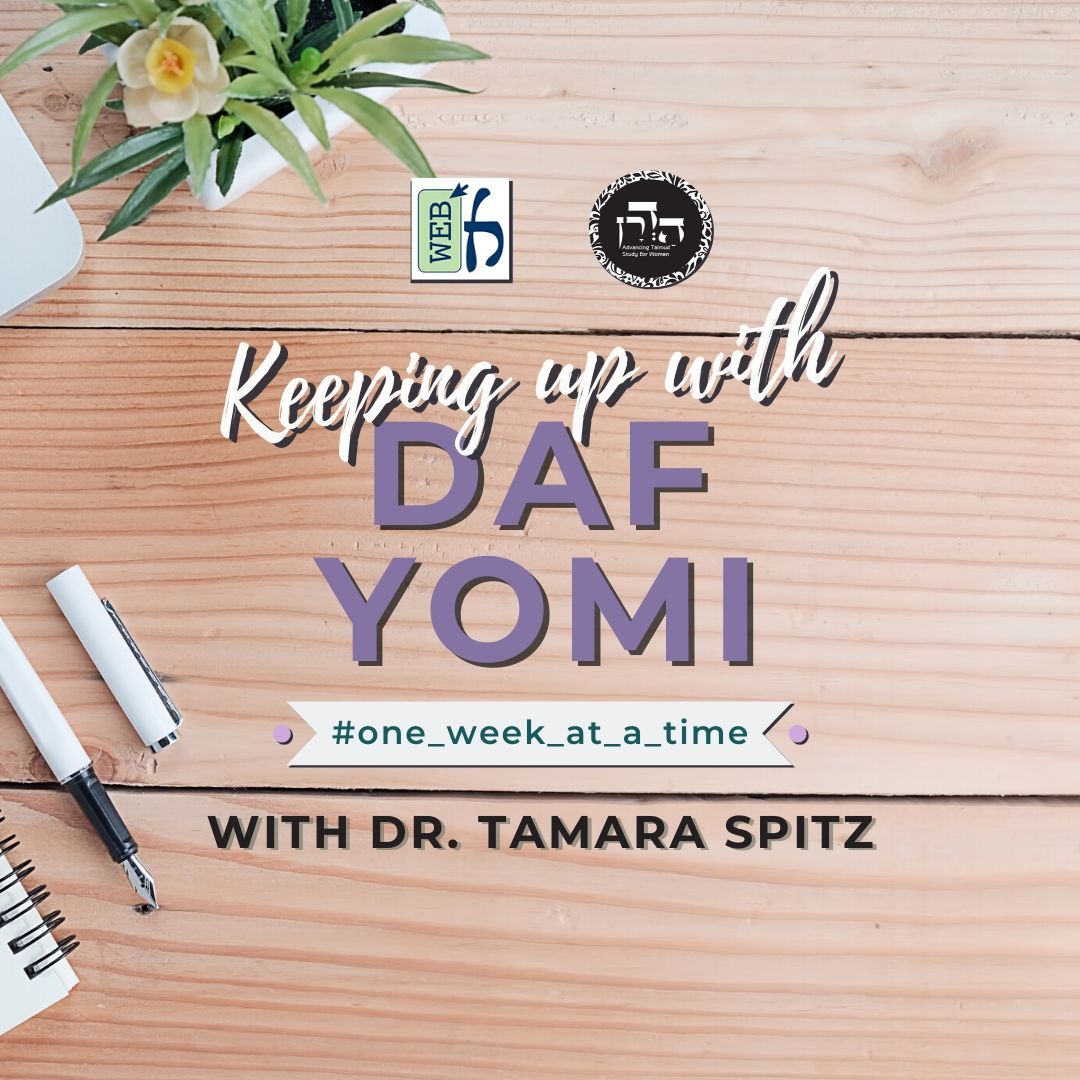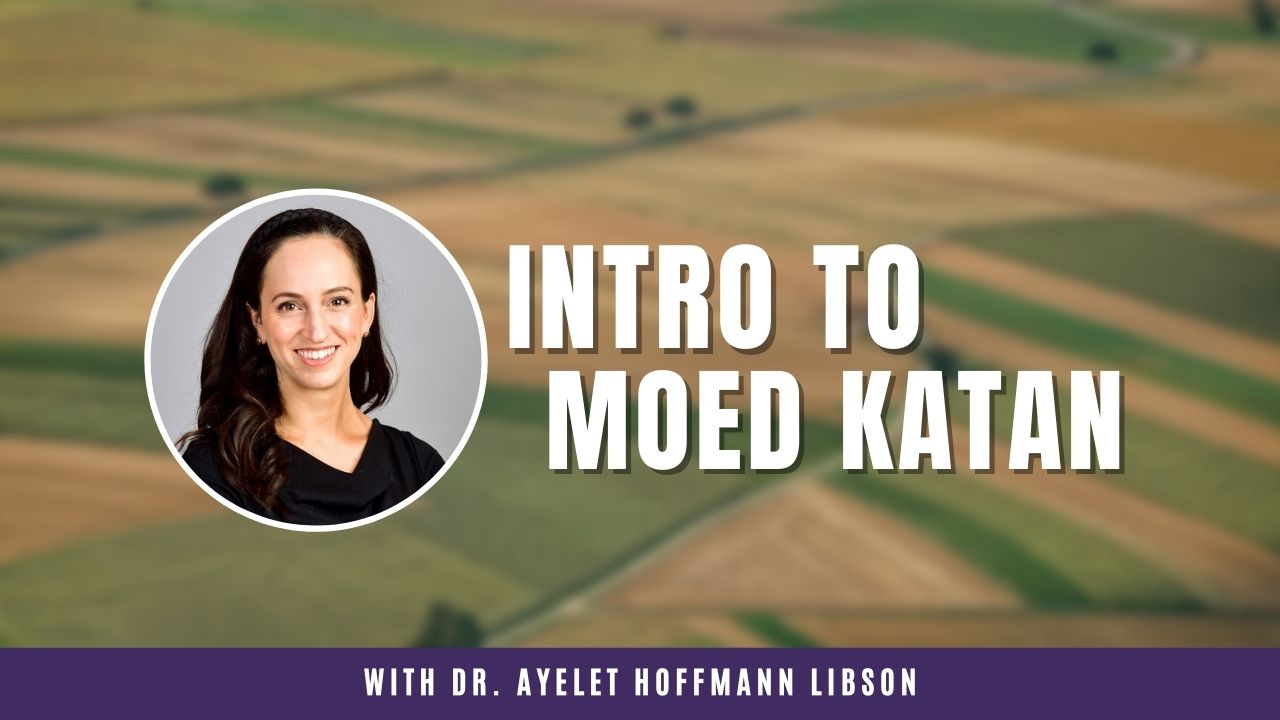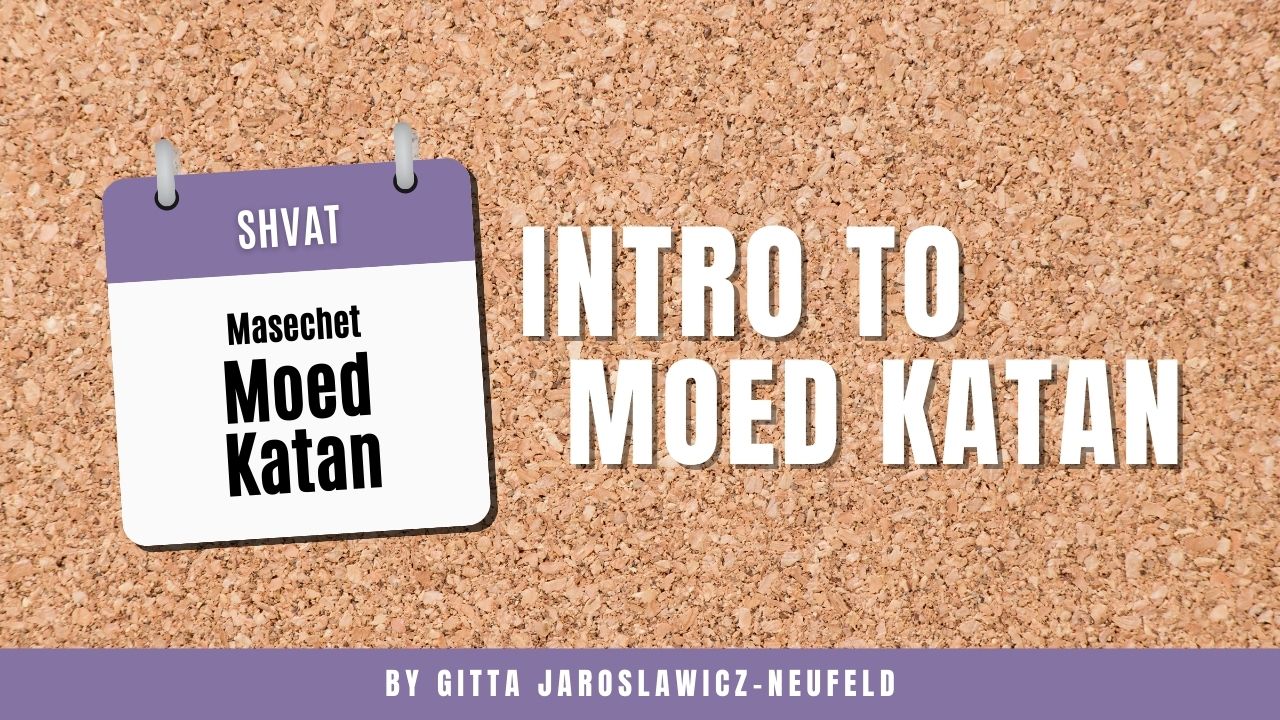Moed Katan 2
מַשְׁקִין בֵּית הַשְּׁלָחִין בַּמּוֹעֵד וּבַשְּׁבִיעִית, בֵּין מִמַּעְיָין שֶׁיָּצָא בַּתְּחִילָּה, בֵּין מִמַּעְיָין שֶׁלֹּא יָצָא בַּתְּחִילָּה. אֲבָל אֵין מַשְׁקִין לֹא מִמֵּי הַגְּשָׁמִים, וְלֹא מִמֵּי הַקִּילוֹן.
MISHNA: One may irrigate a field that requires irrigation on the intermediate days of a Festival as well as during the Sabbatical Year, both from a newly emerged spring that began to flow only during the Festival, and from a spring that did not just emerge and that has been flowing for some time. However, one may not irrigate a field with rainwater collected in a cistern, a procedure that requires excessive exertion, or with water drawn with a shadoof [kilon], a lever used to raise water with a bucket from deep down in a well.
וְאֵין עוֹשִׂין עוּגִיּוֹת לַגְּפָנִים. רַבִּי אֶלְעָזָר בֶּן עֲזַרְיָה אוֹמֵר: אֵין עוֹשִׂין אֶת הָאַמָּה בַּתְּחִילָּה בַּמּוֹעֵד וּבִשְׁבִיעִית, וַחֲכָמִים אוֹמְרִים: עוֹשִׂין אֶת הָאַמָּה בַּתְּחִילָּה בַּשְּׁבִיעִית, וּמְתַקְּנִין אֶת הַמְקוּלְקָלוֹת בַּמּוֹעֵד.
And one may not construct circular ditches around the bases of grapevines on the intermediate days of a Festival. Rabbi Elazar ben Azarya says: One may not construct a new water channel during the intermediate days of a Festival or during the Sabbatical Year. And the Rabbis say: One may construct a new water channel during the Sabbatical Year and one may repair damaged water channels during the intermediate days of a Festival.
וּמְתַקְּנִין אֶת קִלְקוּלֵי הַמַּיִם שֶׁבִּרְשׁוּת הָרַבִּים, וְחוֹטְטִין אוֹתָן, וּמְתַקְּנִין אֶת הַדְּרָכִים וְאֶת הָרְחוֹבוֹת וְאֶת מִקְווֹת הַמַּיִם, וְעוֹשִׂין כׇּל צוֹרְכֵי הָרַבִּים, וּמְצַיְּינִין אֶת הַקְּבָרוֹת, וְיוֹצְאִין אַף עַל הַכִּלְאַיִם.
In addition to performing labor on one’s own property in order to avoid financial loss, it is also permitted to perform labor on the intermediate days of a Festival for the public welfare: One may repair damaged water cisterns that are in the public domain, and clean them out by removing the dirt and sediment that accumulated there; one may repair roads, streets, and ritual baths; and one may tend to all other public needs. So too, one may mark graves to inform the public of their ritual impurity, and inspectors may even go out to uproot the shoots of prohibited diverse kinds [kilayim] that grew in the fields during the rainy season.
גְּמָ׳ הַשְׁתָּא יֵשׁ לוֹמַר מִמַּעְיָין שֶׁיָּצָא בַּתְּחִילָּה, דְּאָתֵי לְאִינְּפוֹלֵי — מַשְׁקִין, מִמַּעְיָין שֶׁלֹּא יָצָא בַּתְּחִילָּה, דְּלָא אָתֵי לְאִינְּפוֹלֵי — מִיבַּעְיָא?
GEMARA: The Gemara begins by questioning the wording of the mishna: Now that it has been said that on the intermediate days of a Festival one may irrigate a field from a newly emerged spring, whose walls have not yet stabilized and are likely to collapse, necessitating laborious repairs, is it necessary to mention that one may irrigate a field from a spring that did not just emerge, whose walls have already stabilized and are therefore not likely to collapse?
אָמְרִי, אִצְטְרִיךְ: אִי תַּנָּא מַעְיָין שֶׁיָּצָא בַּתְּחִילָּה, הֲוָה אָמֵינָא: הָכָא הוּא דְּבֵית הַשְּׁלָחִין — אִין, בֵּית הַבַּעַל — לָא, מִשּׁוּם דְּאָתֵי לְאִינְּפוֹלֵי. אֲבָל מַעְיָין שֶׁלֹּא יָצָא בַּתְּחִילָּה, דְּלָא אָתֵי לְאִינְּפוֹלֵי — אֵימָא אֲפִילּוּ בֵּית הַבַּעַל נָמֵי,
The Gemara answers: They say that it was necessary to mention the second case as well. For had the tanna taught us the halakha with regard to only a newly emerged spring, I would have said that here, in the case of a field that requires irrigation, yes, one is permitted to irrigate from such a spring, but in the case of a field that ordinarily suffices with rainwater, no, one is not permitted to do so, because it is likely to collapse. But with regard to a spring that did not just emerge, that is not likely to collapse, I might say that one may provide supplementary irrigation even in the case of a field that ordinarily suffices with rainwater.
קָא מַשְׁמַע לַן: לָא שְׁנָא מַעְיָין שֶׁיָּצָא בַּתְּחִילָּה, וְלָא שְׁנָא מַעְיָין שֶׁלֹּא יָצָא בַּתְּחִילָּה, בֵּית הַשְּׁלָחִין — אִין, בֵּית הַבַּעַל — לָא.
Therefore, the tanna teaches us that a newly emerged spring is no different from a spring that did not just emerge. In the case of a field that requires irrigation, yes, one may irrigate on the intermediate days of a Festival, while in the case of a field that ordinarily suffices with rainwater, no, one may not do so, even from an established spring.
וּמַאי מַשְׁמַע דְּהַאי ״בֵּית הַשְּׁלָחִין״ לִישָּׁנָא דְּצָחוּתָא הִיא — דִּכְתִיב: ״וְאַתָּה עָיֵף וְיָגֵעַ״, וּמְתַרְגְּמִינַן: וְאַתְּ מְשַׁלְהֵי וּלְאֵי.
The Gemara raises a question with regard to a linguistic issue: And from where may it be inferred that this term, beit hashelaḥin, a field that requires irrigation, is a term denoting thirst, implying that supplementary watering is necessary? The Gemara answers: As it is written: “And you were faint and weary” (Deuteronomy 25:18). The term faint is referring to the thirst of the Israelites in the desert. And, in the standard Aramaic translation, we translate the verse as: And you were thirsty [meshalhei] and weary. The letters ḥet and heh are sometimes interchanged, and therefore the term beit hashelaḥin connotes a thirsty field.
וּמַאי מַשְׁמַע דְּהַאי ״בֵּית הַבַּעַל״ לִישָּׁנָא דִּמְיַיתְּבוּתָא הִיא — דִּכְתִיב: ״כִּי יִבְעַל בָּחוּר בְּתוּלָה״, וּמְתַרְגְּמִינַן: אֲרֵי כַּמָּה דְּמִיתּוֹתַב עוּלֵם עִם בְּתוּלְתָּא יִתְיַיתְּבוּן בְּגַוִּיךְ בְּנַיִיךְ.
And from where may it be inferred that this term, beit haba’al, a field that suffices with rainwater, is a term denoting settlement, i.e., an established field that does not require extensive upkeep? As it is written: “For as a young man takes to himself [yiv’al] a virgin, so shall your sons take you to themselves” (Isaiah 62:5). And it is translated in the Aramaic translation: As a young man settles down with a virgin, so shall your sons become settled within you. Similarly, beit haba’al is referring to a settled field that suffices with rainwater.
מַאן תַּנָּא דִּפְסֵידָא — אִין, הַרְוָוחָה — לָא, וַאֲפִילּוּ בִּמְקוֹם פְּסֵידָא — מִיטְרָח נָמֵי לָא טָרְחִינַן?
The Gemara begins to clarify the underlying principle of the mishna, asking: Who is the anonymous tanna of the mishna who maintains that labor performed to prevent a considerable loss, such as watering a field that requires irrigation, yes, it is permitted on the intermediate days of a Festival; but labor performed to increase one’s profit, such as watering a field that ordinarily suffices with rainwater, no, it is not permitted? Furthermore, even in a case involving loss, one may not excessively exert oneself, as the tanna of the mishna renders prohibited all cases of watering fields with collected rainwater or with water drawn with a shadoof, even in a field that requires irrigation.
אָמַר רַב הוּנָא: רַבִּי אֱלִיעֶזֶר בֶּן יַעֲקֹב הִיא. דִּתְנַן, רַבִּי אֱלִיעֶזֶר בֶּן יַעֲקֹב אוֹמֵר: מוֹשְׁכִין אֶת הַמַּיִם מֵאִילָן לְאִילָן, וּבִלְבַד שֶׁלֹּא יַשְׁקֶה אֶת הַשָּׂדֶה כּוּלָּהּ.
Rav Huna said: It is Rabbi Eliezer ben Ya’akov, as we learned in a mishna: Rabbi Eliezer ben Ya’akov says: In a field filled with trees, one may draw water via channels from tree to tree, provided that in doing so he does not water the entire field. As this field ordinarily suffices with rainwater, it is prohibited to water the entire field. Therefore, it is evident that Rabbi Eliezer ben Ya’akov renders prohibited work performed to increase profit on the intermediate days of a Festival.
אֵימוֹר דְּשָׁמְעַתְּ לֵיהּ לְרַבִּי אֱלִיעֶזֶר הַרְוָוחָה דְּלָא, טִירְחָא בִּמְקוֹם פְּסֵידָא מִי שָׁמְעַתְּ לֵיהּ?
The Gemara challenges this comparison: Say that you heard that Rabbi Eliezer ben Ya’akov holds that labor performed only to increase profit is not permitted. But did you hear him prohibit excessive exertion in a case of considerable loss? This aspect of the mishna finds no expression in the words of Rabbi Eliezer ben Ya’akov.
אֶלָּא אָמַר רַב פָּפָּא: הָא מַנִּי — רַבִּי יְהוּדָה הִיא, דְּתַנְיָא: מַעְיָין הַיּוֹצֵא בַּתְּחִילָּה — מַשְׁקִין מִמֶּנּוּ אֲפִילּוּ שְׂדֵה בֵּית הַבַּעַל, דִּבְרֵי רַבִּי מֵאִיר. רַבִּי יְהוּדָה אוֹמֵר: אֵין מַשְׁקִין אֶלָּא שְׂדֵה בֵּית הַשְּׁלָחִין שֶׁחָרְבָה. רַבִּי אֶלְעָזָר בֶּן עֲזַרְיָה אוֹמֵר: לֹא כָּךְ וְלֹא כָּךְ. יָתֵר עַל כֵּן אָמַר רַבִּי יְהוּדָה: לֹא יַפְנֶה אָדָם אַמַּת הַמַּיִם וְיַשְׁקֶה לְגִינָּתוֹ וּלְחוּרְבָּתוֹ בְּחוּלּוֹ שֶׁל מוֹעֵד.
Rather, Rav Pappa said: In accordance with whose opinion is this mishna? It is in accordance with the opinion of Rabbi Yehuda, as it is taught in a baraita: From a newly emerged spring one may irrigate even a field that ordinarily suffices with rainwater; this is the statement of Rabbi Meir. Rabbi Yehuda says: One may irrigate only a field requiring irrigation that dried up and needs water. Rabbi Elazar ben Azarya says: Neither the one nor the other. Furthermore, Rabbi Yehuda said: Owing to the exertion involved, one may not divert a water channel from its regular path in order to water his garden or his ruin, which is now being used for planting, during the intermediate days of a Festival.
מַאי ״חָרְבָה״? אִילֵּימָא חָרְבָה מַמָּשׁ, לְמָה לִי דְּמַשְׁקֵי לַהּ? אָמַר אַבָּיֵי: שֶׁחָרְבָה מִמַּעְיָין זֶה וְיָצָא לָהּ מַעְיָין אַחֵר.
The Gemara first clarifies the case of the baraita: What does Rabbi Yehuda mean when he speaks of a field that is dried up? If we say that the field is literally dried up and the plants are already parched, why do I need to water it? Abaye said: It means that the one spring from which the field had been irrigated until now dried up, but in the meantime another spring emerged. If the field is not irrigated from this spring, it will be ruined.
רַבִּי אֶלְעָזָר בֶּן עֲזַרְיָה אוֹמֵר לֹא כָּךְ וְלֹא כָּךְ, לָא שְׁנָא חָרַב מַעְיָינָהּ וְלָא שְׁנָא לֹא חָרַב מַעְיָינָהּ — מַעְיָין שֶׁיָּצָא בַּתְּחִילָּה לָא.
The Gemara explains the next clause of the baraita, which states: Rabbi Elazar ben Azarya says: Neither the one nor the other. By this he means that it is no different whether the original spring dried up or did not dry up. The guiding principle is: From a newly emerged spring one may not irrigate even a field that requires irrigation. In any event, Rabbi Yehuda seems to maintain an opinion that is like that of the mishna, i.e., that only a field that requires irrigation may be watered, but not a field that suffices with rainwater. And even in the case of a field that requires irrigation, excessive exertion is prohibited.
וּמִמַּאי? דִּלְמָא עַד כָּאן לָא קָאָמַר רַבִּי יְהוּדָה: בֵּית הַשְּׁלָחִין — אִין, בֵּית הַבַּעַל — לָא, אֶלָּא מַעְיָין שֶׁיָּצָא בַּתְּחִילָּה
The Gemara challenges this understanding: And from where do you conclude that the mishna reflects the opinion of Rabbi Yehuda? Perhaps Rabbi Yehuda stated that a field that requires irrigation, yes, one may irrigate it on the intermediate days of a Festival, and a field that suffices with rainwater, no, one may not do so, only with regard to a newly emerged spring,
דִּלְמָא אָתֵי לְאִינְּפוֹלֵי. אֲבָל מַעְיָין שֶׁלֹּא יָצָא בַּתְּחִילָּה, דְּלָא אָתֵי לְאִינְּפוֹלֵי — אֲפִילּוּ בֵּית הַבַּעַל נָמֵי!
as it is likely to collapse. But in the case of a spring that did not just emerge, which is not likely to collapse because its walls have already stabilized, even a field that ordinarily suffices with rainwater may be irrigated.
אִם כֵּן — מַתְנִיתִין אַמַּאן תִּרְמְיַיהּ? אֶלָּא: לְרַבִּי יְהוּדָה לָא שְׁנָא מַעְיָין שֶׁיָּצָא בַּתְּחִילָּה, וְלָא שְׁנָא מַעְיָין שֶׁלֹּא יָצָא בַּתְּחִילָּה, בֵּית הַשְּׁלָחִין — אִין, בֵּית הַבַּעַל — לָא. וְהַאי דְּקָתָנֵי מַעְיָין שֶׁיָּצָא בַּתְּחִילָּה, לְהוֹדִיעֲךָ כֹּחוֹ דְּרַבִּי מֵאִיר, דַּאֲפִילּוּ מַעְיָין הַיּוֹצֵא בַּתְּחִילָּה — מַשְׁקִין מִמֶּנּוּ אֲפִילּוּ שְׂדֵה הַבַּעַל.
The Gemara asks: If that were so, then to whom, i.e., to which tanna, would you attribute the mishna? According to this interpretation, the mishna does not correspond to any opinion, while according to the previous interpretation, it corresponds to the opinion of Rabbi Yehuda. Rather, it must be that according to the opinion of Rabbi Yehuda, a newly emerged spring is no different from a spring that did not just emerge. A field that requires irrigation, yes, it may be irrigated, while a field that suffices with rainwater, no, it may not be irrigated. And the baraita opted to teach this dispute in the case of a newly emerged spring in order to convey the far-reaching nature of the opinion of Rabbi Meir, which states that one may irrigate even from a newly emerged spring, and even a field that suffices with rainwater.
אִתְּמַר: הַמְנַכֵּשׁ וְהַמַּשְׁקֶה מַיִם לִזְרָעִים בְּשַׁבָּת, מִשּׁוּם מַאי מַתְרִינַן בֵּיהּ? רַבָּה אָמַר: מִשּׁוּם חוֹרֵשׁ. רַב יוֹסֵף אָמַר: מִשּׁוּם זוֹרֵעַ.
§ It was stated that the amora’im disputed the following question: With regard to one who weeds or one who waters seedlings on Shabbat, for what prohibited labor do we forewarn him? Judicial punishment may be administered to a sinner only if he has been forewarned by two witnesses prior to the commission of his offense. This forewarning must include the specific transgression being violated, and on Shabbat it must include the specific category of prohibited labor that the action involves. Rabba said: It is due to the prohibition against plowing. Rav Yosef said: It is due to the prohibition against sowing.
אָמַר רַבָּה, כְּווֹתִי דִּידִי מִסְתַּבְּרָא: מָה דַּרְכּוֹ שֶׁל חוֹרֵשׁ — לְרַפּוֹיֵי אַרְעָא, הַאי נָמֵי מְרַפֵּויי אַרְעָא. אָמַר רַב יוֹסֵף, כְּווֹתִי דִּידִי מִסְתַּבְּרָא: מָה דַּרְכּוֹ שֶׁל זוֹרֵעַ — לְצַמּוֹחֵי פֵּירָא, הָכָא נָמֵי מְצַמַּח פֵּירָא.
Rabba said: According to my opinion it is reasonable. Just as the usual objective of plowing is to loosen the earth, so too, this, weeding or watering, loosens the earth. Rav Yosef said: According to my opinion, it is reasonable. Just as the usual objective of sowing is to cause the fruit to grow, here too, weeding or watering causes the fruit to grow.
אֲמַר לֵיהּ אַבָּיֵי לְרַבָּה: לְדִידָךְ קַשְׁיָא וּלְרַב יוֹסֵף קַשְׁיָא. לְדִידָךְ קַשְׁיָא: מִשּׁוּם חוֹרֵשׁ אִין, מִשּׁוּם זוֹרֵעַ לָא? לְרַב יוֹסֵף קַשְׁיָא: מִשּׁוּם זוֹרֵעַ אִין, מִשּׁוּם חוֹרֵשׁ לָא?
Abaye said to Rabba: According to your opinion, it is difficult, and according to the opinion of Rav Yosef, it is difficult. Abaye explains: According to your opinion, it is difficult: Is it true that for the prohibition against plowing, yes, he is forewarned, but for the prohibition against sowing, no, he is not forewarned? Similarly, according to the opinion of Rav Yosef, it is difficult: Can it be that for the prohibition against sowing, yes, he is forewarned, but for the prohibition against plowing, no, he is not forewarned? Everyone should agree that weeding and watering fall under the categories of both plowing and sowing.
וְכִי תֵּימָא: כׇּל הֵיכָא דְּאִיכָּא תַּרְתֵּי לָא מִיחַיַּיב אֶלָּא חֲדָא, וְהָאָמַר רַב כָּהֲנָא: זוֹמֵר וְצָרִיךְ לָעֵצִים — חַיָּיב שְׁתַּיִם. אַחַת מִשּׁוּם נוֹטֵעַ, וְאַחַת מִשּׁוּם קוֹצֵר.
And if you say that anywhere that there are two possible categories of prohibited labor into which a particular action might fall, one is liable to be punished for only one of them, didn’t Rav Kahana say: If one prunes the branches of a vine on Shabbat and he needs the wood for firewood or any other purpose, he is liable to bring two sin-offerings? He is liable to bring one sin-offering for violating the primary category of sowing, as pruning vines facilitates their growth, and so it is a sub-category of sowing. And he is liable to bring one sin-offering for violating the primary category of reaping, as the essence of reaping is detaching that which one needs from the ground. Since he needs the wood that he is detaching from the vine, his action is considered reaping. Consequently, one action that incorporates two prohibited labors causes liability for both.
קַשְׁיָא.
The Gemara concludes: Indeed, it is difficult according to both opinions.
אֵיתִיבֵיהּ רַב יוֹסֵף לְרַבָּה: הַמְנַכֵּשׁ וְהַמְחַפֶּה לְכִלְאַיִם לוֹקֶה. רַבִּי עֲקִיבָא אוֹמֵר: אַף הַמְקַיֵּים.
Rav Yosef raised an objection to the opinion of Rabba from what is taught in the following baraita: One who weeds in proximity to diverse kinds of seeds, or covers with earth the exposed roots of diverse kinds, is flogged for transgressing the prohibition against diverse kinds, i.e., tending different species of crops in one area of the same field, as it is stated: “You shall not sow your field with two kinds of seed” (Leviticus 19:19). Rabbi Akiva says: Even one who maintains in his field a mixture of species that he could have uprooted is flogged for violating the prohibition against diverse kinds of seeds.
בִּשְׁלָמָא לְדִידִי, דְּאָמֵינָא מִשּׁוּם זוֹרֵעַ — הַיְינוּ דַּאֲסִירָא זְרִיעָה בְּכִלְאַיִם, אֶלָּא לְדִידָךְ, דְּאָמְרַתְּ מִשּׁוּם חוֹרֵשׁ — חֲרִישָׁה בְּכִלְאַיִם מִי אֲסִירָא?
Rav Yosef explains: Granted, according to my opinion, that I say that one who weeds on Shabbat is forewarned for the prohibited labor of sowing, this is the reason he is liable to be punished with flogging for weeding diverse seeds: Sowing diverse kinds is prohibited. But according to you, who said that one who weeds on Shabbat is forewarned for plowing, why is one liable to be flogged for weeding in proximity to diverse kinds? Is plowing prohibited in connection with diverse kinds? At the time of plowing, there is no mixture of different species of crops, so plowing cannot be prohibited in this case.
אֲמַר לֵיהּ: מִשּׁוּם מְקַיֵּים.
Rabba said to him: According to my opinion, one who weeds a field of diverse kinds is flogged not because he is guilty of plowing, but for violating the prohibition against maintaining a mixture of species in his field.
וְהָא מִדְּקָתָנֵי סֵיפָא: רַבִּי עֲקִיבָא אוֹמֵר אַף הַמְקַיֵּים, מִכְּלָל דְּתַנָּא קַמָּא לָאו מִשּׁוּם מְקַיֵּים הוּא!
The Gemara objects: However, from the fact that it teaches in the latter clause of the baraita that Rabbi Akiva says: Even one who maintains in his field a mixture of species is liable to be flogged, it may be inferred that according to the anonymous first tanna, the liability for weeding is not for maintaining diverse kinds, but for performing some other prohibited labor.
כּוּלַּהּ רַבִּי עֲקִיבָא הִיא, וּ״מַאי טַעַם״ קָאָמַר: מַאי טַעַם הַמְנַכֵּשׁ וְהַמְחַפֶּה בְּכִלְאַיִם לוֹקֶה מִשּׁוּם מְקַיֵּים — שֶׁרַבִּי עֲקִיבָא אוֹמֵר: אַף הַמְקַיֵּים.
The Gemara rejects this opinion: In fact, the entire baraita reflects the opinion of Rabbi Akiva, and it is stated in the style of what is the reason. The baraita should be understood as follows: What is the reason that one who weeds and one who covers the exposed roots of diverse kinds with earth is flogged? He is flogged for maintaining diverse kinds in his field, as Rabbi Akiva says: Even one who maintains in his field a mixture of species is flogged.
מַאי טַעְמָא דְּרַבִּי עֲקִיבָא? דְּתַנְיָא: ״שָׂדְךָ לֹא תִזְרַע כִּלְאָיִם״, אֵין לִי אֶלָּא זוֹרֵעַ, מְקַיֵּים מִנַּיִין?
With regard to Rabbi Akiva’s opinion, the Gemara asks: What is the reason for Rabbi Akiva’s opinion? How did he derive this prohibition from the verses? The Gemara answers: As it is taught in a baraita: “You shall not sow your field with mingled seed” (Leviticus 19:19). I have derived from this verse that only sowing diverse kinds is prohibited. From where is it derived that maintaining diverse kinds, which does not involve any positive action, is also prohibited?
תַּלְמוּד לוֹמַר: ״כִּלְאַיִם שָׂדְךָ לֹא״.
The verse states: “Diverse kinds, you shall not sow your field with mingled seed” (Leviticus 19:19). The prohibition against planting different species of a crop in one area of the same field is preceded in the verse by the prohibition against crossbreeding livestock: “You shall not let your cattle gender with a diverse kind.” A slight change in punctuation yields the phrase: Diverse kinds in your field, you shall not, indicating that merely preserving diverse kinds in one’s field is prohibited.
תְּנַן: מַשְׁקִין בֵּית הַשְּׁלָחִין בַּמּוֹעֵד וּבִשְׁבִיעִית.
§ The Gemara returns to the original topic of discussion: We learned in the mishna: One may irrigate a field that requires irrigation on the intermediate days of a Festival as well as during the Sabbatical Year.
בִּשְׁלָמָא מוֹעֵד, מִשּׁוּם טִירְחָא הוּא, וּבִמְקוֹם פְּסֵידָא שָׁרוּ רַבָּנַן. אֶלָּא שְׁבִיעִית, בֵּין לְמַאן דְּאָמַר מִשּׁוּם זוֹרֵעַ וּבֵין לְמַאן דְּאָמַר מִשּׁוּם חוֹרֵשׁ, זְרִיעָה וַחֲרִישָׁה בִּשְׁבִיעִית מִי שְׁרֵי?
The Gemara asks: Granted, with regard to the intermediate days of a Festival, where the prohibition against irrigation is due to the mandate to avoid excessive exertion on the Festival, in a case of considerable loss, the Sages permitted one to exert himself. However, during the Sabbatical Year, both according to the one who said that one who waters is liable due to the prohibition against sowing, and according to the one who said that one is liable due to the prohibition against plowing, are sowing and plowing permitted during the Sabbatical Year? How can these actions be permitted when the Torah explicitly renders prohibited working the land during the Sabbatical Year?
אָמַר אַבָּיֵי: בִּשְׁבִיעִית בִּזְמַן הַזֶּה, וְרַבִּי הִיא. דְּתַנְיָא, רַבִּי אוֹמֵר: ״וְזֶה דְּבַר הַשְּׁמִטָּה שָׁמוֹט״. בִּשְׁתֵּי שְׁמִיטוֹת הַכָּתוּב מְדַבֵּר, אַחַת שְׁמִיטַּת קַרְקַע, וְאַחַת שְׁמִיטַּת כְּסָפִים.
Abaye said: The mishna is referring to the Sabbatical Year in the present time, when its prohibitions are only by rabbinic decree, and it is in accordance with the opinion of Rabbi Yehuda HaNasi. As it is taught in a baraita that Rabbi Yehuda HaNasi says: When the verse states: “And this is the manner of the release, every creditor will release that which he has lent to his neighbor” (Deuteronomy 15:2), the verse speaks of two releases: One is the release of land, that one must refrain from working the land, and the other is the release of money, that one must refrain from collecting debts.
בִּזְמַן שֶׁאַתָּה מְשַׁמֵּט קַרְקַע — אַתָּה מְשַׁמֵּט כְּסָפִים, וּבִזְמַן שֶׁאִי אַתָּה מְשַׁמֵּט קַרְקַע — אִי אַתָּה מְשַׁמֵּט כְּסָפִים.
This verse equates these two releases, indicating that when you are mandated by Torah law to release land, you must release money, and when you are not mandated to release land, you need not release money. This indicates that according to Rabbi Yehuda HaNasi, at the present time, the release of land is not mandated by Torah law. Therefore, observance of the Sabbatical Year is mandated only by rabbinic law, and the Sages were lenient in a case of significant loss.
רָבָא אָמַר: אֲפִילּוּ תֵּימָא רַבָּנַן — אָבוֹת אָסַר רַחֲמָנָא,
Rava said: Even if you say that the mishna was taught in accordance with the opinion of the Rabbis, who disagree with Rabbi Yehuda HaNasi and maintain that the observance of the Sabbatical Year, even at the present time, is mandated by Torah law, one can understand the leniency in the mishna. The reason for the leniency with regard to irrigation is because only primary categories of labor were prohibited by the Merciful One, i.e., by Torah law,

























